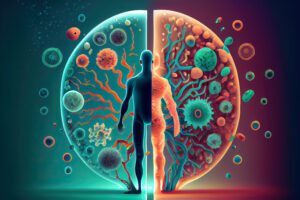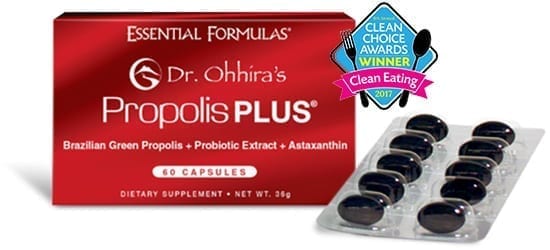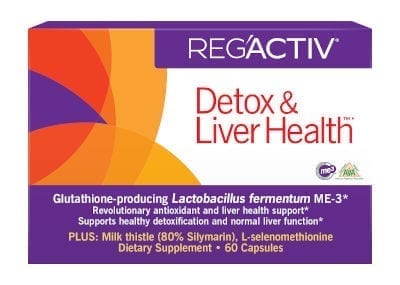If you’ve ever had a “nervous stomach” or received upsetting news that “hit you in the gut,” you know how our emotions can affect our bellies. But did you know that this communication between the brain and the gut actually works both ways? Yes, what is going on in the digestive system can have a significant impact on our brain health. In other words, gut health and mood are interconnected, and the importance of this connection should not be underestimated.
The brain and the gut are actually more similar than you might think. Like the brain, the digestive system (aka the gut) also contains hundreds of millions of nerve cells, or neurons, and is connected to the brain via the vagus nerve. This connection creates a two-way communication system that is known as the gut-brain axis.
Communication between the gut and the brain affects both organs and may explain why a problem with one is often accompanied by difficulties in the other. For example, research has found an interaction between irritable bowel syndrome (IBS) and psychiatric disorders. Imaging done on IBS patients showed changes in various parts of the brain that suggest alteration in the brain circuits responsible for emotion and pain control.
Gut Biome and Mental Health
The gut’s primary role is to digest our food and produce nutrients our bodies need to be healthy. The billions of beneficial microorganisms (a.k.a. probiotics) in the gut, such as bacteria, viruses, and fungi, are there to make this happen. These microbes convert the prebiotic fiber we eat into energy and produce postbiotic compounds our bodies need. Examples of postbiotics include enzymes, vitamins, short-chain fatty acids, and neurotransmitters like serotonin and dopamine, often called “happy hormones,” which are essential for mental health and mood stabilization.
This process works beautifully when the gut microbiome has an adequate diversity of microorganisms. But when there is an imbalance in the ratio of harmful to beneficial bacteria, known as dysbiosis, problems can occur. Insufficient sleep, a course of antibiotics, an unhealthy diet, too much stress, and other factors can kill beneficial microorganisms, disrupting the delicate balance in the microbiome.
When there is an overabundance of harmful gut bacteria, mood can be negatively affected. This is because there may not be enough beneficial microorganisms in place to both fight off the harmful organisms and produce the important neurochemicals, like dopamine and serotonin, which are responsible for regulating mood. This can lead to anxiety, depression, and other mental health problems.
Gut Health and Happiness
Research has shown that the gut is responsible for producing 90% of the serotonin created in the body, with the brain handling the other 10%. You can see how an unhealthy digestive system might lead to a deficiency in this important neurochemical, and how interconnected gut health and happiness are.
Fortunately, an imbalance in the gut microbiome does not have to be permanent. Anyone can add beneficial microorganisms back into their digestive system by eating probiotic-rich foods such as fermented dairy products, fermented soy products, and fermented vegetables. Remember that it’s significant to ensure that these foods contain live organisms. Be sure that the foods you select have not gone through the pasteurization process, which can kill their beneficial bacteria.
If fermented foods don’t fit into your diet, another way to restore gut health is to take a supplement like Dr. Ohhira’s Probiotics®. Dr. Ohhira’s probiotics contain a diverse array of 12 distinct strains of probiotic bacteria, plus prebiotics and postbiotic nutrients as well.
Learn Why Dr. Ohhira’s probiotics are the choice of so many clinical nutritionists. Discover the Dr. Ohhira Advangtage for yourself!.
Frequently Asked Questions on Gut Health and Mental Health
Can Bad Gut Health Affect Your Mood?
Scientific research does indicate that gut health and mental health are interconnected, but more research is needed. The gut is where many of the neurochemicals that affect mood are produced. In fact, 90% of the serotonin in the body is produced in the gut. Without a diverse, healthy population of probiotics, the gut may have difficulty producing the neurotransmitters required for mood regulation and mental health.
Can your gut change your mood?
Important mood-enhancing biochemicals like serotonin and dopamine (sometimes called happy hormones) are produced in the gut. These substances play a large part in regulating our mood and determining our level of satisfaction and contentment. Past research seems to show a strong relationship between gut health and mood, but more study is needed.
How do I fix my gut-brain connection?
The gut and brain are connected in several ways. They are connected via the vagus nerve, and the gut produces neurotransmitters and other chemicals that affect the brain’s function and the body’s immune system. You can strengthen gut health and improve the gut-brain connection by ensuring there is a strong, diverse population of beneficial bacteria in the digestive system. One way to do this is by taking a high-quality probiotic supplement like Dr. Ohhira’s probiotics.
How can I increase serotonin in my gut?
The gut is responsible for producing 90% of the serotonin in the body. Serotonin is essential for feelings of well-being and happiness. To promote gut health and keep your digestive system operating well, be sure to eat a healthy diet, exercise, stay well hydrated, get plenty of sleep, and avoid too much stress. Another way to promote good gut health is to eat fermented food that contains live microorganisms or take a high-quality probiotic supplement like Dr. Ohhira’s probiotics.
If you are looking to add a probiotic supplement to your diet, Dr. Ohhira’s probiotics are an excellent choice. Dr. Ohhira’s supplements are the only probiotics fermented for three years using only all-natural ingredients like fruits, vegetables, pure spring water, and seaweed. And they are non-GMO and 100% vegetarian.
For a probiotic supplement that supports full-body physical and mental health, try Dr. Ohhira’s Probiotics today.





